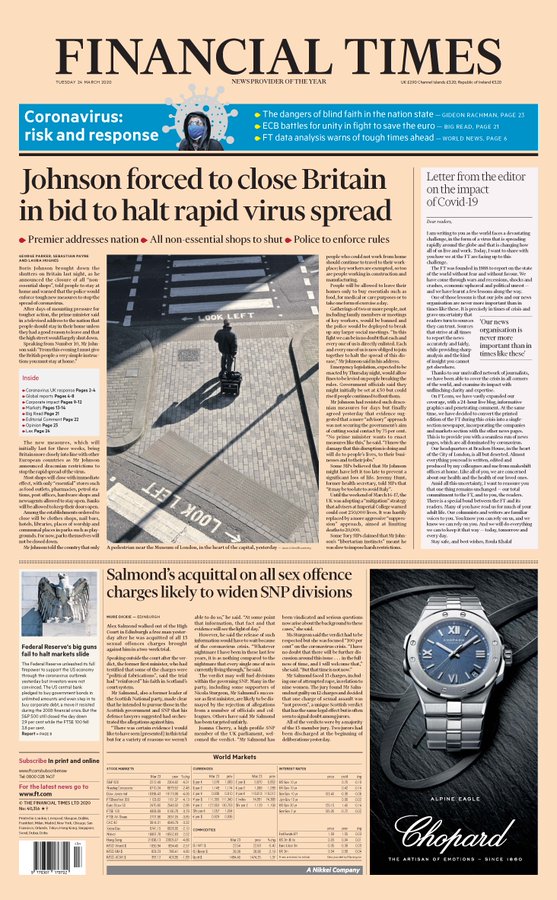
Tomorrow’s front page of The Financial Times (above) confirms that the UK is the latest democracy to adopt unprecedented measures in an effort to combat the coronavirus pandemic.
But the virus also offers proof that China’s authoritarian system, seen in the West as an efficient and exportable “Beijing Model of government,” failed, notes analyst Dan Blumenthal. It failed to protect its citizens (until extreme, highly militarized measures were taken), and it failed to demonstrate a modicum of responsibility to the world with which it is highly enmeshed and from which it derives untold benefits.
Instead, the CCP under Xi acted in very predictable ways for an ever-centralizing autocracy. Xi blamed local officials, ramped up censorship, and disappeared more truth–tellers, he writes for The National Interest.
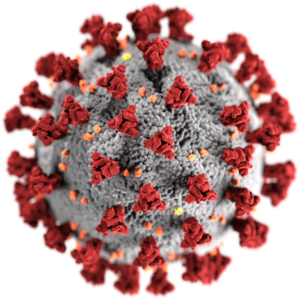 Rather than simply cede authority to all-powerful states, small-d democrats around the world could use this moment to argue for a government that is more accountable and transparent, Slate’s Joshua Keating suggests:
Rather than simply cede authority to all-powerful states, small-d democrats around the world could use this moment to argue for a government that is more accountable and transparent, Slate’s Joshua Keating suggests:
China will do its best to make this virus a case study for the superiority of its political system. But China’s failure to take the early actions that could have prevented this disease from spreading in the first place can also be attributed to tendencies of that same system. Official media downplayed the severity of the crisis for weeks in order to preserve social stability, and local authorities in Wuhan detained and publicly reprimanded the medial workers and bloggers who tried to raise the alarm.
One could just as easily say that China’s political system is the reason the world is in this mess, he adds.
In contrast, democracies like South Korea and Taiwan offer a model of how society can help develop solutions that complement government efforts to slow the spread of the virus and limit the death toll, adds Daron Institute Professor in the Department of Economics at the Massachusetts Institute of Technology. The hard work must involve civil society and private enterprises working together with the state to tackle major institutional and economic problems, he writes for Foreign Affairs.
The bad news is China may be digging in for a more authoritarian rule, according to Weifeng Zhong, a Senior Research Fellow at @mercatus.
“In 2018, economist Julian Chan and I developed a machine-learning algorithm that predicts the Chinese government’s moves by analyzing words in the People’s Daily, China’s version of Pravda,” he writes for The National Interest. “Fast forward to when the dust settles on the novel coronavirus pandemic, also known as COVID-19, and this bot will come in handy as countries regroup and need to reassess how they deal with China.”
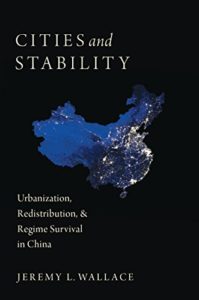 Be skeptical of reports that China has conquered the virus, adds Jeremy L. Wallace, an associate professor of government at Cornell University, and the author of “Cities and Stability: Urbanization, Redistribution, and Regime Survival in China” (Oxford University Press, 2014). Why? Because covid-19 has become a propaganda battle for the ruling Communist Party, he writes for the Post.
Be skeptical of reports that China has conquered the virus, adds Jeremy L. Wallace, an associate professor of government at Cornell University, and the author of “Cities and Stability: Urbanization, Redistribution, and Regime Survival in China” (Oxford University Press, 2014). Why? Because covid-19 has become a propaganda battle for the ruling Communist Party, he writes for the Post.
Initial efforts to suppress information about the virus and continued censorship of public debate throughout the crisis have also added to mistrust of the numbers, The Guardian adds.
“With the cover-up in December and January we really cannot trust the numbers from the Chinese government without more credible and solid evidence to verify,” said Ho-fung Hung, a professor in political economy at Johns Hopkins University.
‘No European solidarity’?
 There is a global battle of narratives going on, writes Joseph Borrell, the High Representative of the European Union, noting that China is aggressively pushing the message that, unlike the US, it is a responsible and reliable partner. In the battle of narratives we have also seen attempts to discredit the EU as such and some instances where Europeans have been stigmatized as if all were carriers of the virus, he observes:
There is a global battle of narratives going on, writes Joseph Borrell, the High Representative of the European Union, noting that China is aggressively pushing the message that, unlike the US, it is a responsible and reliable partner. In the battle of narratives we have also seen attempts to discredit the EU as such and some instances where Europeans have been stigmatized as if all were carriers of the virus, he observes:
We must be aware there is a geo-political component including a struggle for influence through spinning and the ‘politics of generosity’. Armed with facts, we need to defend Europe against its detractors. There is also a battle of narratives within Europe. It is vital that the EU shows it is a Union that protects and that solidarity is not an empty phrase.
Elias Mossialos, head of the Department of Health Policy at the London School of Economics, predicted the number of countries “knocking on China’s door” will give Beijing’s soft power a boost, The Washington Post reports. “There is no European solidarity,” he said.
 China is splurging aid to Italy, the Czech Republic, Lithuania, and other places. These humanitarian gestures are admirable. But be in no doubt of the political price, notes CEPA analyst Edward Lucas (right):
China is splurging aid to Italy, the Czech Republic, Lithuania, and other places. These humanitarian gestures are admirable. But be in no doubt of the political price, notes CEPA analyst Edward Lucas (right):
The memories of Soviet victories and sacrifice on the eastern front against the Third Reich shaped the worldview of countless West Europeans. The Berlin Airlift in 1948 shaped the views of a generation of West Germans, who saw the effort that the Western allies were willing to make to preserve the city’s freedom. Now millions of Italians and others will remember that when they needed it, help came from the east.
Democracies should resist curbs on the internet, Freedom House insists @freedomonthenet
“We’ve said it before and we’ll say it again: Access to the internet is a human right. Especially during emergencies, governments should #KeepItOn,”
 China’s false narrative threatens to spread as quickly as the coronavirus, POLITICO reports, adding that Beijing seems to be winning the propaganda war.
China’s false narrative threatens to spread as quickly as the coronavirus, POLITICO reports, adding that Beijing seems to be winning the propaganda war.
But some Italians see through the soft-power ploy, Alessandra Bocchi writes for The Wall Street Journal:
No amount of foreign aid can make up for the Communist Party’s botched early response that helped produce the pandemic now afflicting most of the world. Even long after the initial outbreak, the Chinese declined to tell other nations about the severity of the threat or to prevent its spread outside China.
“If this is all true, Beijing’s totalitarian regime would have to answer questions on why it thought its state censorship and propaganda were more important than the right to health care of its citizens and those of the world,” said Alessandro Giuli, a TV presenter at the Italian state broadcaster RAI.
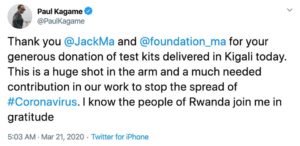 The arrival in Africa of millions of masks, protective shields, and other medical supplies comes as China and the U.S. are locked in an increasingly bitter struggle over who will shape the COVID-19 narrative, reports suggest, with the Chinese trying to persuade the world that the virus didn’t actually originate in Wuhan.
The arrival in Africa of millions of masks, protective shields, and other medical supplies comes as China and the U.S. are locked in an increasingly bitter struggle over who will shape the COVID-19 narrative, reports suggest, with the Chinese trying to persuade the world that the virus didn’t actually originate in Wuhan.
But silencing whistleblowers, spreading propaganda, and threatening to withhold medications from the West are not ‘soft power’ {or what the @NEDemocracy calls sharp power}, Michael Brendan Dougherty writes for the National Review. If the Chinese state had used its massive state capacity to run a minimally functional equivalent to the Food and Drug Administration, there would be no COVID-19 and the world economy would still be humming. If the Chinese state had been minimally honest, the world would have had several weeks longer to prepare.
 All of this happens on top of all the other familiar pathologies, notes analyst Anne Applebaum, (right), a board member of the National Endowment for Democracy (NED): the profound polarization; the merger of politics and entertainment; the loss of faith in democratic institutions; the blind eyes turned to corruption, white-collar crime, and money laundering; the growth of inequality; the conversion of social media and a part of the news media into for-profit vectors of disinformation. These are all part of the deep background to this crisis too, she writes for The Atlantic.
All of this happens on top of all the other familiar pathologies, notes analyst Anne Applebaum, (right), a board member of the National Endowment for Democracy (NED): the profound polarization; the merger of politics and entertainment; the loss of faith in democratic institutions; the blind eyes turned to corruption, white-collar crime, and money laundering; the growth of inequality; the conversion of social media and a part of the news media into for-profit vectors of disinformation. These are all part of the deep background to this crisis too, she writes for The Atlantic.
The political scientist Andrew Michta has drawn controversy and accusations of racism for stating what any measured overview of the evidence makes clear, notes Brookings analyst Shadi Hamid. “The question about assigning agency and blame is pretty straightforward to answer,” he writes in The American Interest. The Chinese state, he says, is culpable.
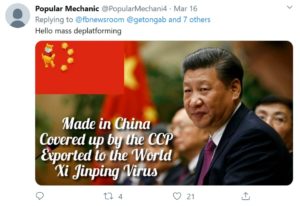 But is this a time for blame? Yes, it is, he writes for The Atlantic:
But is this a time for blame? Yes, it is, he writes for The Atlantic:
Accounting for responsibility when a disaster happens—particularly one likely to devastate entire countries, leaving thousands dead—is not beside the point, particularly as Chinese officials move to take advantage of the crisis and launch a disinformation campaign claiming that the U.S. Army introduced the virus. After the crisis, whenever after is, the relationship with China cannot and should not go back to normal. ….This pandemic should, finally, disabuse us of any remaining hope that the Chinese regime could be a responsible global actor.
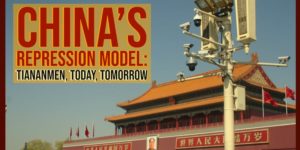
National Endowment for Democracy
Chinese human rights activist Jianli Yang believes that “there should be and must be a moment when all, victimized individuals and countries, come together to hold the CCP regime accountable,” adds Marcus Kolga, a digital communications strategist and expert on foreign disinformation. Authoritarian regimes frequently label foreign criticism of their policies as “racist” as a way to delegitimize them and polarize debate, he writes for Macleans:
By wrapping themselves in ethno-nationalist rhetoric, these regimes often claim that a critique of their actions is equivalent to a critique of the people itself; this heightens the need to be precise with our language and aware of the propaganda efforts of authoritarian regimes. It’s a tried and true tactic in the authoritarian playbook.
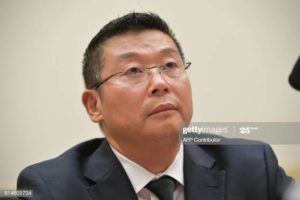
Yang Jianli, president of Initiatives for China, testifies before the House Foreign Relations Committee’s Africa, Global Health, Global Human Rights, and International Organizations subcommittee on the death of Chinese dissident Liu Xiaobo during a hearing in the Rayburn House Office Building on July 14, 2017 in Washington, DC. (Photo credit: MANDEL NGAN/AFP via Getty Images)
As Jianli Yang (right) – a recipient of the NED’s 2008 Democracy Award – underlined, “the Chinese Communist regime is not justified in accusing anyone of racism, who criticize its early-stage covering up of the COVID-19 outbreak, and the latest information (disinformation) war against other countries.”
If there’s one thing worth knowing about China — in terms of geopolitics and American national security at least — it’s that its rulers are almost as afraid of the people as the people are afraid of them. If the people were all in for their form of government and their way of life, this wouldn’t be necessary, analyst Jonah Goldberg argues.
“In 2013 the party issued a list of seven topics that could no longer be discussed with students: universal values, a free press, civil society, civic rights, the party’s past ‘mistakes,’ corruption and an independent judiciary,” veteran China correspondent Isabel Hilton wrote in The Economist in 2018. “This speaks of fear rather than confidence.”
The global pandemic is already being used by the Chinese government for disinformation and geopolitical power-play. How should democratic countries react? the European Values Center for Security Policy asks. A forthcoming on-line panel debate will address how the Chinese Communist Party is manipulating the global pandemic.
Panelists:
- Lucrezia Puggetti, Fellow at MERICS, DE
- Didi Kirsten Tatlow, Senior Fellow at German Council on Foreign Relations and Sinopsis, DE
- Bethany Allen-Ebrahimian, Reporter at Axios, USA
Moderator: Jakub Janda, Director, European Values Center for Security Policy, CZ
Wednesday, March 25: 11:00 – 12:30 EDT (Washington). 16:00 – 17:30 CET (Europe).







